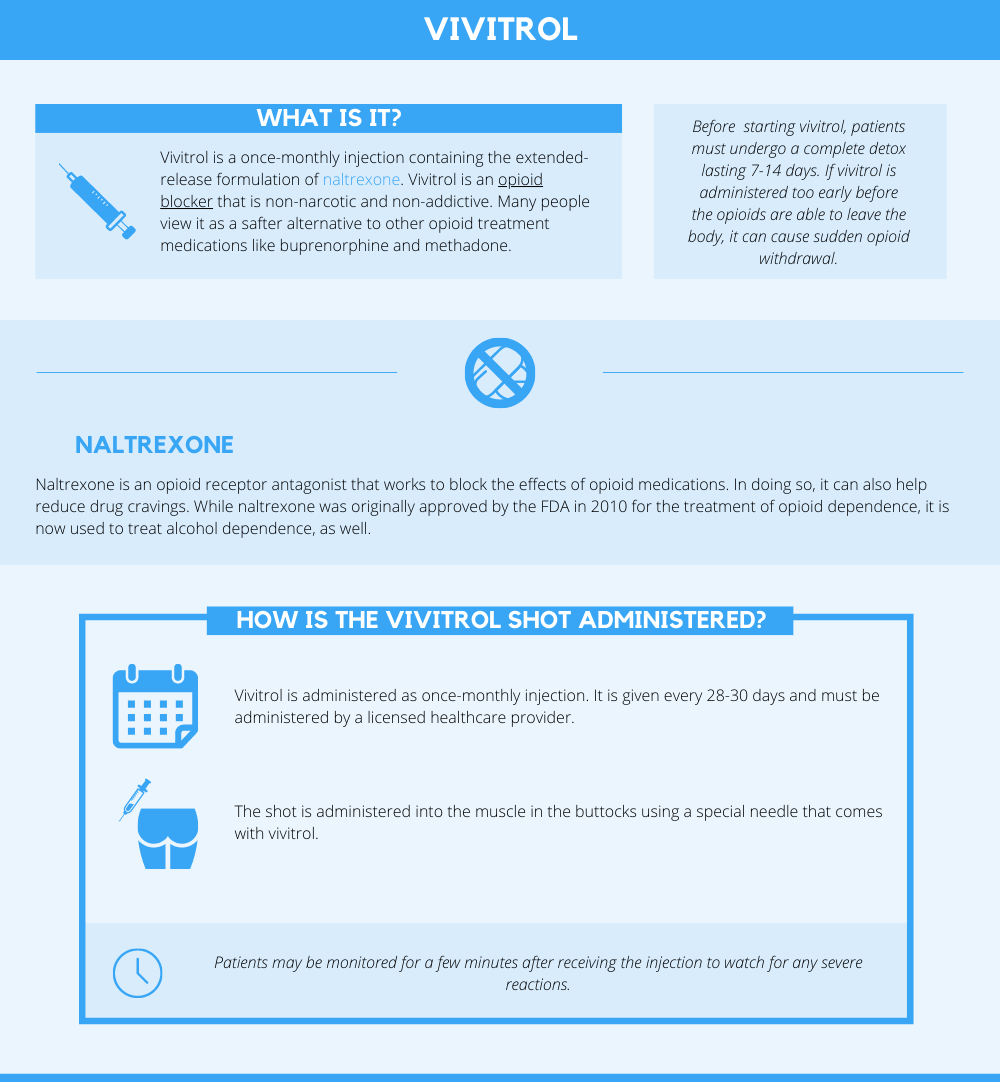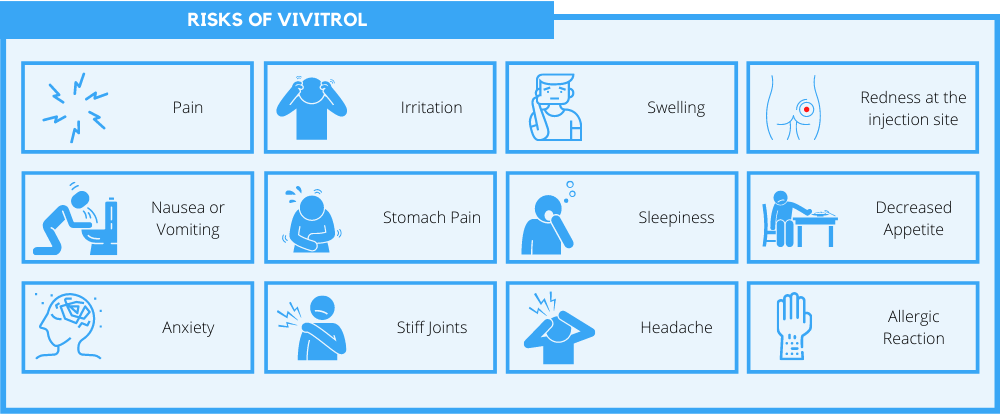Medication-assisted treatment (MAT) is considered the gold standard in treating opioid and alcohol addiction. It involves combining medication management with evidence-based therapies and support groups to provide a “whole-patient” approach to addiction recovery.
The first medication used in MAT was methadone. Methadone is developed with the intention of helping people who are addicted to opioids get sober. However, methadone has opioid-like effects itself and can be habit-forming, especially when abused. And, methadone abuse is a somewhat common occurrence. Some people abuse methadone by purchasing it illegally on the streets while others take an extra high dose or crush and inject their medication.[1]
Due to a concern about medication misuse and diversion, addiction experts set out to develop new, safer alternatives to methadone for opioid replacement therapy. Two of these alternatives are Vivitrol (naltrexone) and Suboxone (buprenorphine/naloxone). In general, Vivitrol is nearly impossible to abuse because it comes in the form of an injection that is administered by a healthcare professional. Patients are not sent home with extra vials of the shot. Suboxone, on the other hand, has fallen under public scrutiny due to some people’s tendencies to abuse the drug. But is Vivitrol really safer than Suboxone? Let’s look at the details of each drug to gain a better understanding.
What is Suboxone?
Suboxone is a medication that is approved by the FDA to treat opioid use disorder. It is a drug that contains both buprenorphine and naloxone. Suboxone must be taken 1-2 times per day and it usually comes in the form of a sublingual film that dissolves under the tongue.[2]
Suboxone is effective at reducing opioid withdrawal symptoms, cravings, and opioid abuse. It is considered a Schedule III prescription drug because although it is accepted for medical use, it may cause physical or psychological dependence if it is abused.
Buprenorphine is an opioid. Although it is weaker than other more addictive opioids, like heroin or oxycodone, it is still an opioid. That means it can be habit-forming if taken for an extended period of time. As a result, many people who take Suboxone will experience withdrawal symptoms upon ceasing the medication.
Suboxone withdrawal is similar to opioid withdrawal, however, it is not as intense. Usually, Suboxone withdrawal can be managed on an outpatient basis. The primary risk of withdrawal comes with the fact that cravings may reoccur and lead individuals to relapse if they aren’t prepared to cope on their own.
Understanding Vivitrol

Vivitrol is a once-monthly injection that is approved by the FDA to treat opioid and alcohol use disorder. This injection is given once every month and contains an extended-release formulation of naltrexone. Unlike Suboxone, Vivitrol does not treat opioid or alcohol withdrawal. It must only be administered after patients have detoxed for at least 7-10 days.[3]
Vivitrol is proven to help reduce cravings for opioids and alcohol, therefore, helping reduce opioid and alcohol relapse. It is the only FDA-approved medication for opioid dependence that is not considered a controlled substance. It is not a controlled substance because it has accepted medical use and little to no risk for abuse or dependence.
Naltrexone is not habit-forming. Thus, when people stop taking Vivitrol, they don’t experience any withdrawal symptoms. This is one of many reasons why some patients prefer Vivitrol over Suboxone.
Risks of Suboxone
While the primary risk of Suboxone comes from the possibility of relapse after stopping the medication, there are other potential risks, as well. In high doses, Suboxone can have opioid-like effects that encourage some people to abuse the drug. Suboxone abuse can lead to more drug-seeking behaviors, physical dependence, and psychological addiction.
As an opioid, Suboxone reduces heart rate and slows down the central nervous system. If combined with other central nervous system depressants, like other opioids, alcohol, or benzodiazepines, an overdose can easily occur.
Suboxone must be taken on a daily basis. If patients skip a dose, they may experience cravings or go into withdrawal. Since it is taken daily, people with poor medication adherence may forget to take their medication, accidentally take two doses, abuse their medication, or sell their prescription illegally.
Risks of Vivitrol
Vivitrol is a very low-risk medication. The most common side effect that is bothersome to patients is pain, irritation, swelling, and redness at the injection site.[4]
Other potential side effects and adverse reactions to Vivitrol include:

- Nausea or vomiting
- Stomach pain
- Sleepiness
- Decreased appetite
- Anxiety
- Stiff joints
- Headache
- Allergic reaction
Another risk associated with Vivitrol is what happens when it is administered too soon after a person stops taking opioids. Taking Vivitrol before a proper detox can lead to sudden and severe opioid withdrawal symptoms that are difficult to manage.
In Conclusion: Is Vivitrol Safer Than Suboxone?
The primary reason why people believe Vivitrol is safer than Suboxone is due to the method of administration. Vivitrol only has to be administered once every month. This means the patient doesn’t have to keep up with a daily pill, isn’t risking abusing their medication, and doesn’t have to worry about missing a dose or taking too much. Vivitrol is also not habit-forming, unlike Suboxone.
While both medications can be extremely useful in treating opioid addiction, Vivitrol may be a safer option than Suboxone for people who struggle with taking daily medications or sticking to their doctor’s instructions. It may also be a better long-term option for people who are at a high risk of relapse during withdrawal since Vivitrol doesn’t produce withdrawal symptoms.
Start Rehab in West Palm Beach Today
Vivitrol and Suboxone are only two medications used in addiction treatment. And, there’s a chance that neither one is right for you! Everyone is different, so everyone deserves a unique treatment experience that addresses their individual needs. To speak with a treatment professional to learn about your treatment options or about Vivitrol and Suboxone, pick up the phone and give us a call today. We can’t wait to help you.
References:
- https://www.ncbi.nlm.nih.gov/pmc/articles/PMC1070723/
- https://www.accessdata.fda.gov/drugsatfda_docs/label/2010/022410s000lbl.pdf
- https://www.fda.gov/drugs/postmarket-drug-safety-information-patients-and-providers/naltrexone-extended-release-injectable-suspension-marketed-vivitrol-information
- https://www.ncbi.nlm.nih.gov/pmc/articles/PMC2376083/











